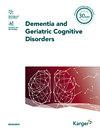“Emergency Room Evaluation and Recommendations” and Incident Hospital Admissions in Older People with Major Neurocognitive Disorders Visiting Emergency Department: Results of an Experimental Study
IF 2.2
4区 医学
Q3 CLINICAL NEUROLOGY
引用次数: 0
Abstract
Introduction: Older people with major neurocognitive disorders (MNCDs) visiting the emergency department (ED) are at high risk of hospital admissions. The “Emergency Room Evaluation and Recommendations” (ER2) tool decreases the length of stay (LOS) in the hospital when older people visiting ED are hospitalized after an index ED visit, regardless of their cognitive status. Its effect on hospital admissions has not yet been examined in older people with MNCD visiting ED. This study aimed to examine whether ER2 recommendations were associated with incident hospital admissions and LOS in ED in older people with MNCD visiting ED. Methods: A total of 356 older people with MNCD visiting ED of the Jewish General Hospital (Montreal, Quebec, Canada) were recruited in this non-randomized, pre-post-intervention, single arm, prospective and longitudinal open label trial. ED staff and patients were blinded of the ER2 score, and patients received usual ED care during the observation period, whereas ED staff were informed about the ER2 score, and patients had ER2 tailor-made recommendations in addition to usual care during the intervention period. Hospital admissions and the LOS in ED were the outcomes. Results: There were less incident hospital admissions (odds ratio ≤ 0.61 with p ≤ 0.022) and longer LOS in ED (coefficient beta ≥4.28 with p ≤ 0.008) during the intervention period compared to the observation period. Discussion/Conclusion: ER2 recommendations have mixed effects in people with MNCD visiting ED. They were associated with reduced incident hospital admissions and increased LOS in ED, suggesting that they may have benefits in addition to usual ED care.“急诊室评估和建议”与急诊科就诊的严重神经认知障碍老年人的住院事件:一项实验研究的结果
患有严重神经认知障碍(mncd)的老年人到急诊科(ED)就诊的风险很高。“急诊室评估和建议”(ER2)工具减少了老年人在索引ED就诊后住院的住院时间(LOS),无论其认知状况如何。影响住院尚未检查在老年人MNCD访问。本研究旨在考察ER2建议是否与事件相关的住院和洛埃德在老年人MNCD访问。方法:总共有356老年人MNCD来访的ED的犹太总医院(蒙特利尔,魁北克,加拿大)招募非随机性,pre-post-intervention、单臂、勘察和试验纵向开放标签。ED工作人员和患者对ER2评分不知情,患者在观察期间接受常规ED护理,而ED工作人员被告知ER2评分,患者在干预期间除了常规护理外还接受ER2量身定制的建议。结果是住院率和急诊科的LOS。结果:与观察组相比,干预期ED的住院发生率较低(优势比≤0.61,p≤0.022),LOS较长(系数β≥4.28,p≤0.008)。讨论/结论:ER2建议对到访急诊科的MNCD患者有不同的效果。它们与减少急诊科住院事件和增加急诊科LOS相关,这表明除了常规的急诊科护理外,它们可能还有其他益处。
本文章由计算机程序翻译,如有差异,请以英文原文为准。
求助全文
约1分钟内获得全文
求助全文
来源期刊
CiteScore
4.70
自引率
0.00%
发文量
46
审稿时长
2 months
期刊介绍:
As a unique forum devoted exclusively to the study of cognitive dysfunction, ''Dementia and Geriatric Cognitive Disorders'' concentrates on Alzheimer’s and Parkinson’s disease, Huntington’s chorea and other neurodegenerative diseases. The journal draws from diverse related research disciplines such as psychogeriatrics, neuropsychology, clinical neurology, morphology, physiology, genetic molecular biology, pathology, biochemistry, immunology, pharmacology and pharmaceutics. Strong emphasis is placed on the publication of research findings from animal studies which are complemented by clinical and therapeutic experience to give an overall appreciation of the field.

 求助内容:
求助内容: 应助结果提醒方式:
应助结果提醒方式:


